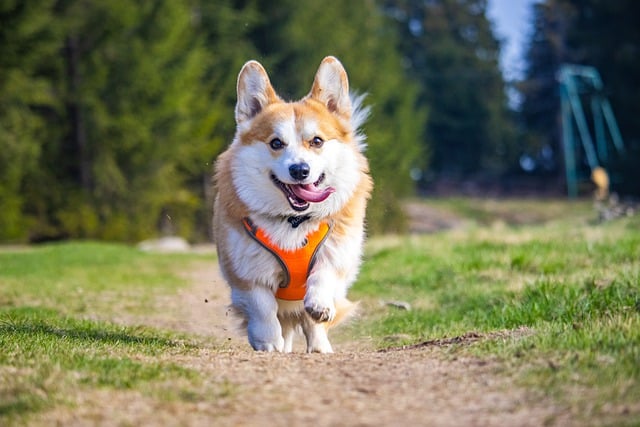Corgis, with their distinctive short stature, robust bodies, and an irresistibly playful demeanor, are among the most beloved dog breeds worldwide. Originally bred in Wales for herding cattle and sheep, Corgis have evolved into much-loved companions, recognized for their intelligence and charm. This breed is divided into two distinct types: the Pembroke Welsh Corgi and the Cardigan Welsh Corgi, both known for their endearing qualities and strong herding instincts. Despite their popularity, Corgis exhibit a range of behaviors that can be quite unusual and sometimes humorous. These habits not only underscore their unique personality traits but also reflect their historical working background. This article explores the seven most unusual habits of Corgis, shedding light on these quirky behaviors and offering insights into what makes this breed so special and engaging.

1. “Corgi Flop”
One amusing and quite distinctive behavior observed in Corgis is known as the “Corgi flop.” When overly excited or simply in a relaxed state, a Corgi might suddenly flop over onto their back with little warning. This quirky action can seem dramatic, as if they’ve suddenly run out of energy and need a quick break. This behavior is often a sign of trust when it occurs around their owners, indicating their comfort and contentment. It’s also a way for them to cool down quickly by exposing their belly and getting maximum contact with cool surfaces.
2. Herding Small Objects
Despite their small size and domesticated lifestyle, Corgis often retain strong herding instincts, which can manifest in amusing ways. They may attempt to herd small objects around the house, such as balls, toys, or sometimes even moving shadows. This behavior is a remnant of their past as herding dogs, where they were tasked with moving and controlling livestock. For Corgi owners, providing puzzle toys and engaging in games that stimulate these instincts can help manage this behavior while keeping their Corgi mentally and physically stimulated.
3. Spinning in Circles
Corgis are known for their tendency to spin in circles, especially when excited or before doing something they enjoy, like going for a walk or receiving food. This spinning behavior is thought to be an expression of their anticipation and joy. It can also be a way for them to expel some of their boundless energy. Observing a Corgi spinning around can be quite entertaining, though it’s important to ensure this behavior does not stem from anxiety or become obsessive.
4. Obsessive Barking
Corgis have a vocal nature, which can sometimes lead to unusual levels of barking. They may bark to communicate a variety of messages—from alerting about a stranger’s approach to expressing excitement or even boredom. This habit can be traced back to their roles as farm dogs, where barking was an essential part of their job in guarding and herding. Corgi owners often find that proper training and regular exercise can help manage excessive barking, ensuring it doesn’t become a nuisance.
5. “Bunny Hopping”
Corgis have a distinctive way of running where both their hind legs move together, often referred to as “bunny hopping.” This unusual gait is due to their long body and short legs, designed to help them dodge kicks from cattle. While it’s a natural movement for Corgis, it’s crucial to monitor this behavior to ensure it’s not exacerbated by health issues such as hip dysplasia, a common concern in breeds with similar body types.
6. Resource Guarding
Some Corgis develop a habit of guarding their resources, which can include food, toys, or even their favorite resting spots. This behavior likely stems from their historical working environment, where resources could be limited. While this can be a problematic behavior, it’s often manageable with proper training and socialization techniques that teach them to trust their environment and their owners.
7. Digging
Corgis are prone to digging, a behavior that can be traced back to their need to create dens or hunt small animals like rodents. In a home setting, this can lead to gardens being excavated and lawns turned over. Providing a designated digging area and engaging them in other activities can help manage this instinctual behavior.
In conclusion, Corgis are as quirky as they are charming, with unusual habits that reflect both their historical background and their vibrant personalities. Understanding and appreciating these behaviors can enhance the bond between Corgis and their owners, making life with these spirited dogs a joyous and fulfilling experience. Proper training and care ensure that their more challenging traits are managed effectively, allowing their endearing qualities to shine through.
 Toledo, United States.
Toledo, United States.